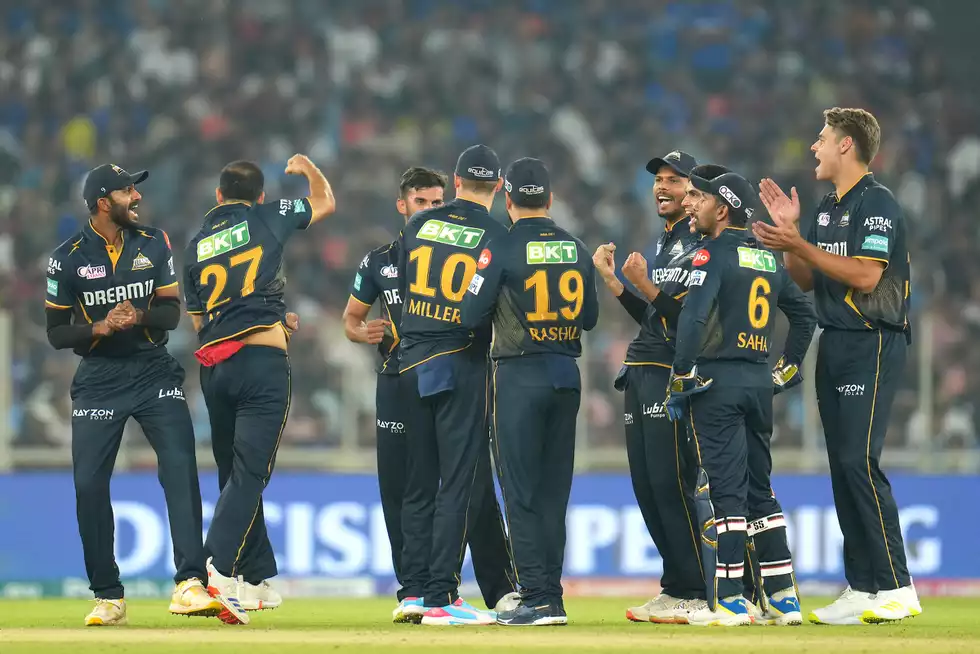Gujarat Titans ruin Mumbai Indians strategy in The First Match
The Unwavering Gujarat Titans ruin MI’s strategy in The First Match
What if the Mumbai Indians lost their opening game of the season once more? MI have not won their opening game since 2013, the year Rohit Sharma assumed leadership of the team. Didn’t they anticipate the outcome? False. The simplicity of this result has nothing to do with the Mumbai Indians’ habit of losing their first games. Rather, it represents the Gujarat Titans’ unflinching will to battle.
With the help of foreign captains like David Miller, Kane Williamson, and Rashid Khan and a highly aware coaching staff under the direction of Ashish Nehra, Shubman Gill devised a methodical strategy that ultimately resulted in the Mumbai Indians’ demise.
This team’s ability to handle everything is their greatest quality. Over the last two years, we have given competition a lot of our attention. That was Ashish Nehra’s speech, and regardless of the outcome, we are incredibly happy with the way we played and I believe we competed pretty well. The Titans’ spinner, R Sai Kishore, praised the Gujarat team’s mentality, saying, “I think all credit to the culture he has set up here for the last two years.” With their unrelenting resilience and perseverance, the Gujarat team prevented MI from winning the match.
At the conclusion of the game, Mumbai Indians batting coach Kieron Pollard stated, “One thing (that is) constant in life is change,” albeit in a different context. Although the Trinidadian was not alluding to the team’s worst curse, the Titans’ brain trust had meticulously planned and executed the game.
Even though it was just the fifth game of the season, Nehra and company have already seen the benefits of the new rule. It allowed a second bouncer in an over. They used it in the IPL this year for the first time. Gerald Coetzee, Tim Davie, Hardik Pandya, and Piyush Chawla all got out to what might have been the over’s second short ball.
Nehra was the mastermind behind the scenes, but seasoned performers Mohit Sharma and Umesh Yadav were flawless in their execution. The head coach appeared to be directing the action from the sidelines, sending instructions to the middle after each delivery, as is his custom. Mumbai, needing seven wickets remaining, could not chase 38 runs from 25 balls.
“We made a lot more attempts to penetrate the wicket. We made a lot more of an effort to trust our length in the final overs rather than going straight for Yokers because the wicket was moving, and I believe it helped us get a lot of wickets. When describing the instructions from the dugout, left-arm spinner Sai Kishore stated, ,”I think that’s what he was emphasizing.”
In a Ranji tournament last month, Sai Kishore bowled all four of his overs in a row, an uncommon occurrence in a Twenty20 competition. Normally, they distribute the bowlers’ allotment of overs evenly, but Nehra and Gill believed they had to keep the MI batsmen in check in the middle. Sai Kishore proved to be useful. In his four overs, he finished with the valuable scalp of Rohit Sharma at 1 for 24.
Bowling four overs in a row resembles a one-day match more than anything else. So that you can have rhythm. Bowling is a lot simpler now. We are genuinely tinkering with the impact player rule. The skipper will allow me to bowl those four overs in a row during the middle overs. Sai Kishore clarified the reasoning behind bowling all four overs in a single session. “But I’m open to bowling it as one, one, one,” he replied.
Before the thirteenth over, he had reached his quota. The other spinner on the team, Rashid Khan, completed his four overs in two periods. Mohit Sharma destroyed the Mumbai Indians’ batting with a shrewd combination of deliveries. The most cunning of which was a slow bouncer. In the midst, Nehra was dictating the story from behind the scenes.
“In the real world, we’re playing professionals at cricket. Thus, they will also have plans. But we were essentially in control of the game for around thirty-six overs. And we kind of let it slide in the final quarter, which is how we lost. There are a few obvious aspects to consider. Like the fact that the competition is still relatively new. New players are still learning what is required at this level and other things. Therefore, hopefully, we can get it right,” Pollard added, conceding that a cunning opposition had surpassed them.


